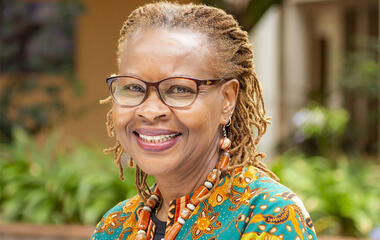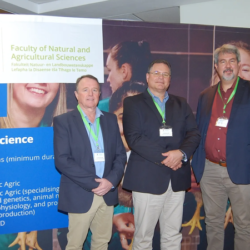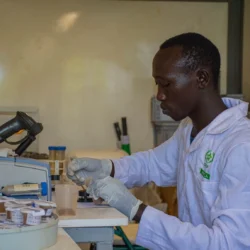Kenyan scientist Dr Susan Kaaria, the director of African Women in Agricultural Research and Development (AWARD), has witnessed how targeted gender-responsive agricultural research can yield remarkable success in empowering women scientists to grow in their visibility, confidence, influence and professional capacity.
Building on its achievements, AWARD’s strategic plan for the next few years aligns closely with the African Union’s Agenda 2063 and cuts across several of the United Nations’ Sustainable Development Goals (SDGs), including SDG 2, that focuses on zero hunger, SDG 5, that focuses on gender equality, and SDG 13, which deals with climate action.
As part of the International Day of Women and Girls, which is observed in February, Kaaria spoke to University World News about AWARD’s work and shared her perspectives about the role of African women in agricultural research and local food systems.
Kaaria has about 20 years’ experience in international development, having served as an agricultural extension officer in Kenya before joining AWARD and becoming a team leader for gender at the United Nations’ Food and Agriculture Organization (FAO) in Rome, Italy.
She holds a PhD in natural resource economics from the University of Minnesota, a masters degree in agricultural economics from Iowa State University, both in the United States, and a bachelor degree in agriculture from the University of East Africa in Kenya.
UWN:Drawing on your extensive experience in international development, what is the current landscape like for women in agricultural research?
SK: The current landscape reflects both progress and persistent challenges. Women agricultural researchers in Sub-Saharan Africa [as a percentage of the total number of agricultural researchers] rose from an average of 23% to 28% between 2008 and 2016.
Women remain underrepresented in postgraduate programmes, high-level research, management, and decision-making positions. The underrepresentation persists, with recent empirical evidence revealing each step on the science career ladder sees drops in female participation.
A 2020 study on gender and student performance in Sub-Saharan Africa revealed that women represent over half the science graduates at bachelor level, at 53% compared to 43% at the masters and 28% at PhD level.
Multiple interconnecting factors, including culturally defined domestic expectations, the lack of supportive institutional policies and the lack of a culture that nurtures and rewards rigorous research, contribute tremendously to the underrepresentation of women in science and technology fields.
So, despite the progress, more work is needed to accelerate progress towards increasing the numbers and experiences of women in agricultural research and in agrifood systems.
UWN:Reflecting on AWARD’s 15-year history, could you highlight some of the organisation’s most notable achievements?
SK: Over the past 15 years, AWARD has made significant strides in advancing gender-responsive agricultural research for development.
An external evaluation of our 2017-22 strategy revealed that our flagship AWARD fellowship contributed to building and sustaining a strong talent pool of African women agricultural researchers.
More than 92% of the fellows are women, and many of them (57%) have grown into leadership positions within and outside their institutions across the African Agricultural Research for Development (AR4D) landscape.
For instance, Dr Damaris Odeny, a plant molecular breeder and a 2010 Kenyan AWARD Fellow, is now a cluster leader of genomics, pre-breeding and bioinformatics at the International Crops Research Institute for the Semi-Arid Tropics (ICRISAT).
Social scientist and 2018 AWARD Fellow Dr Eveline Compaoré from Burkina Faso is leading research in agricultural innovation systems and innovations and public policies at the Institut de l’Environnement et de Recherches Agricoles (INERA), while a 2009 AWARD Fellow, Dr Rhoda Mukuka, is one of the continent’s leading food and nutrition security advisers working as a national coordinator for nutrition at FAO Zambia.
We scaled out our flagship fellowship model into the climate change space, establishing a unique fellowship in 2018 designed to bring gender into the climate change conversation and emphasise intra-Africa collaborations.
To date, 309 African researchers from 16 countries have benefited from the One Planet Fellowship. A mid-term review revealed its strong relevance, with 90% of the participants highlighting mentoring as a critical contributor.
It further showed that more than 60% of the participants improved their understanding of the importance of gender in research and their ability to integrate a gender-responsive approach in research – with remarkable success in empowering women scientists to grow in their visibility, confidence, influence and professional capacity.
We also extended our fellowship’s benefits to African women policy professionals to catalyse the design and implementation of gender-responsive agricultural policies.
The Gender Responsive Agriculture Systems Policy (GRASP) fellowship is supporting women policy professionals to lead policy changes to improve African smallholders’ livelihoods.
We piloted our Gender Responsive Agricultural Research and Development initiative and learned invaluable lessons on strengthening AR4D institutions’ capacities to integrate gender in their policies and practices, and address systemic gender barriers.
UWN:In light of the ongoing fight against hunger and climate change, can you elaborate on the unique perspectives and contributions that women bring to address these challenges?
SK: Women in agricultural science have unique perspectives and expertise that are crucial for addressing the complex challenges of hunger and climate change. As primary stakeholders in agrifood systems, they possess valuable traditional knowledge and practices that can inform sustainable and resilient agricultural solutions.
Diverse perspectives and approaches to research lead to more holistic and inclusive problem-solving processes.
By empowering women in agricultural science and providing them with opportunities to contribute to decision-making and innovation, the world can harness their full potential to drive transformative change and build resilient food systems in the face of climate change and food insecurity.
UWN:AWARD recently unveiled its five-year strategy. Could you outline the key goals of this plan and how it aims to empower women researchers, fostering their progression into leadership roles within agricultural research and development by 2027?
SK: The 2023-27 strategy is centred on three strategic pillars aimed at strengthening the contribution of AR4D and advancing gender equality in agrifood systems. The key goals of this plan include investing in individuals to build a pipeline of capable and influential women leaders in AR4D, strengthening institutions to embrace gender-responsive policies and practices and influencing the environment to cultivate a gender-responsive AR4D ecosystem.
We seek to enhance the leadership capabilities of women researchers at all career stages and target early career and emerging leaders for a sustainable and strong pipeline.
We aim to equip women policy professional to analyse gender policies, incorporate gender in policies and influence the design and implementation of the policies.
UWN:How does this strategy contribute to the African Union’s Agenda 2063 and to the attainment of the SDGs?
SK: Each aspect of the strategy aligns closely with the African Union’s Agenda 2063 and the SDGs, particularly SDG 2, that focuses on zero hunger, SDG 5 that focuses on gender equality, and SDG 13, which deals with climate action.
By investing in women researchers and promoting gender-responsive agricultural research and development, AWARD will significantly contribute to the realisation of Agenda 2063’s vision of a prosperous and sustainable Africa because there is no food security for all without gender equality.
Furthermore, gender-responsive policies are critical if innovations are to provide efficient, inclusive, resilient and sustainable solutions for Africa to feed its growing population.
Integrating gender in food systems policies will provide the legal framework for driving action and allocating the necessary investments to not only close current gender resource gaps, but also address underlying causes of gender inequality and women’s empowerment.
UWN:How do you see the strategy shaping gender-responsive policies on both institutional and national levels, and what impact can it have on the broader agricultural landscape?
SK: The strategy will be fostering institutional transformation. Through targeted capacity-building initiatives and advocacy efforts, AWARD plans to support institutions to develop internally orientated strategies and interventions to support gender integration in their vision and the mission, staffing, human resource policies and organisational culture.
Moreover, we intend to generate actionable evidence on what works to advance gender responsiveness within AR4D institutional policies and practices to better inform policies, strategies, programmes and budgetary decisions.
We intend to raise awareness of the importance of gender equality in agricultural research and development and advocate for policy changes that promote gender-responsive approaches.
Ultimately, these efforts can lead to more inclusive and equitable agrifood systems, with positive impacts on productivity, livelihoods, and sustainable development outcomes across the agricultural landscape.
UWN:How does AWARD plan to engage and inspire the next generation of young women to pursue careers in agricultural research and contribute to sustainable development?
SK: A key part of our new strategy focuses on supporting early-career women researchers. AWARD is collaborating with educational institutions, research organisations and other stakeholders to promote STEM [science, technology, engineering and mathematics] education and encourage young women to pursue studies in agricultural science.
We are intensifying our efforts to strengthen the capacity of AWARD alums to become change agents and to influence gender responsiveness in their institutions and mentor younger women in STEM.
We have launched a customised leadership programme [the AWARD Leadership Program for Emerging Women in Science], which is targeting emerging women scientists to address the systemic gender disparities that have persisted in STEM disciplines.
UWN:What do African universities and the higher education system in general need to do to produce more women scientists, including those who specialise in agriculture?
SK: First, they need to create a more supportive and inclusive environment for women in STEM fields. This includes implementing policies and initiatives to attract and retain women students and faculty, providing mentorship and support networks for women in STEM, and promoting gender-responsive teaching and research practices.
Efforts to challenge gender stereotypes and biases, both within academic institutions and broader society, are crucial for creating pathways for women to pursue careers in science and agriculture.
By prioritising gender equity and inclusivity in STEM education and research, African universities can empower women scientists to contribute fully to agricultural development and sustainable food systems.
UWN:Finally, women form the bulk of the agriculture workforce in most of Africa, both in their family farms, and as labourers on commercial farms. Are they proportionately represented at both agriculture research and policymaking levels?
SK: Unfortunately, they are not. Gender disparities in these areas reflect broader inequalities in access to education, resources and decision-making power.
While there has been progress in increasing the representation of women in agricultural research and policymaking, barriers – including limited access to funding and resources – cultural and societal norms that prioritise men’s leadership, and systemic biases within academic and political institutions remain.
To address these disparities, concerted efforts are needed – efforts to promote gender equality and inclusivity in agricultural research and policymaking, targeted initiatives to support women researchers and policymakers, gender-responsive policies and programmes, and advocacy for women’s participation and leadership in decision-making processes.
By ensuring that women are proportionately represented at all levels of the agricultural sector, we can harness the full potential of gender diversity to drive innovation, productivity and sustainability in agrifood systems.




